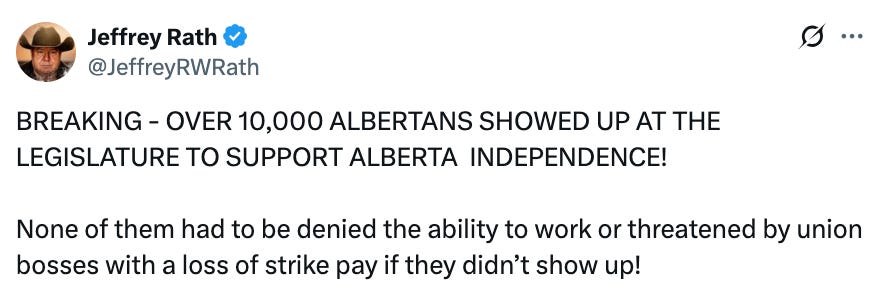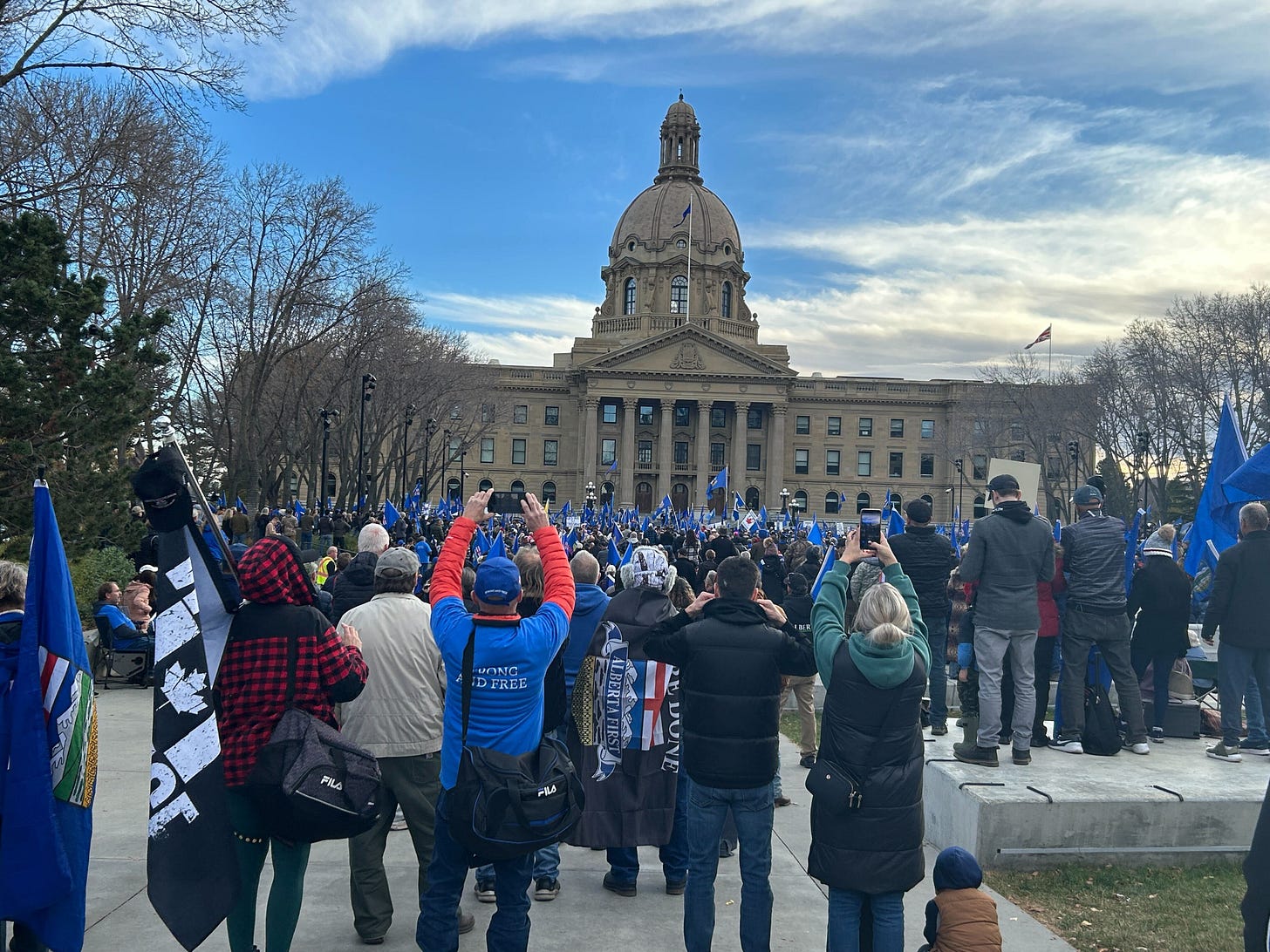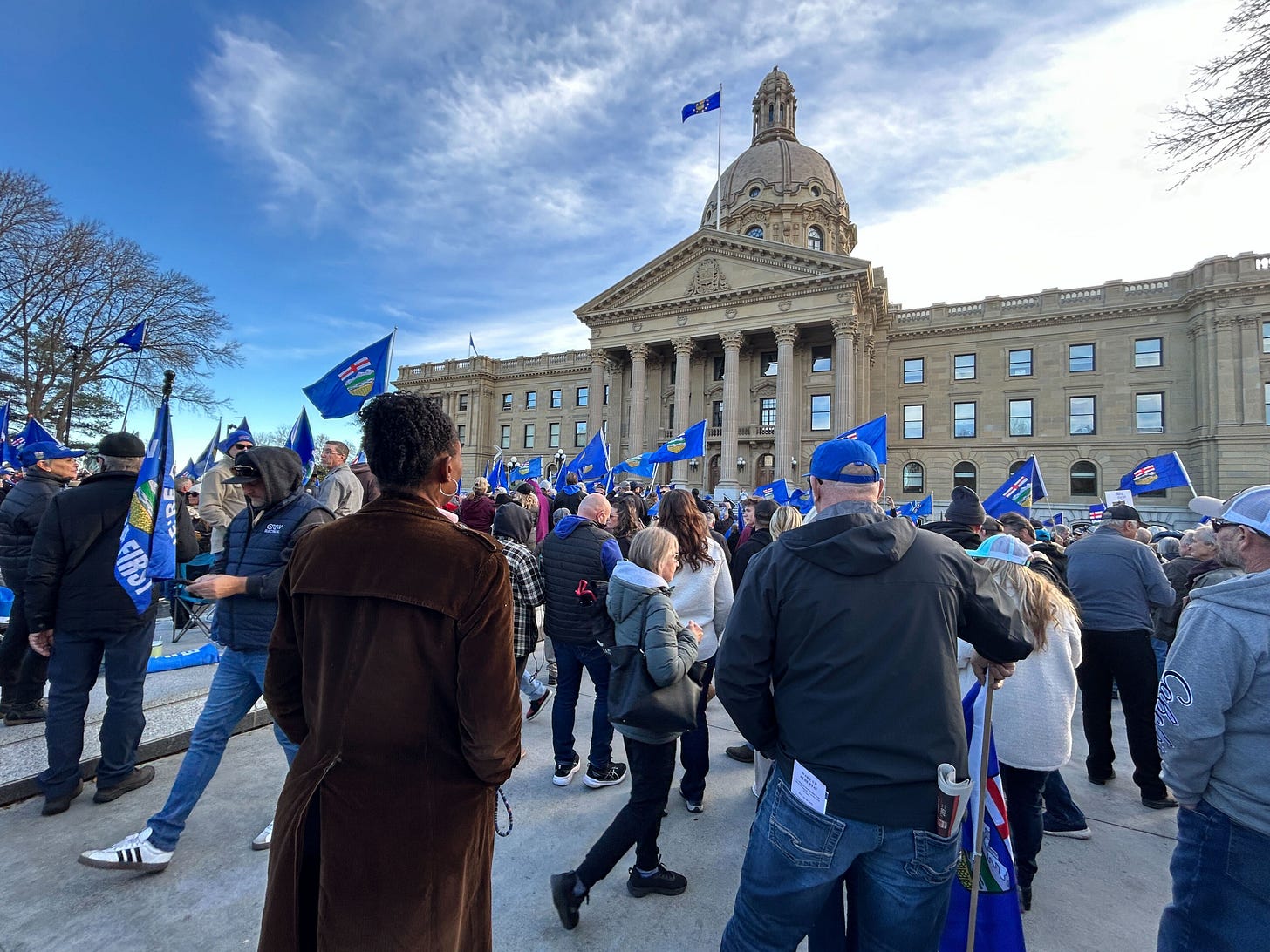Katie Pasitney
Nadine Wellwood
Katie Pasitney
Nadine Wellwood
Video footage from drone.
The ostriches, corralled in a kill pen, were shot dead in the dark of last nite. They were panicked, the sound of the gun shots is captured.
The carcasses were then tarped over.
Already (this morning), the kill pen is being dismantled.
Shock, unbelievable – – Canadians are getting to know their Government.
The Federal Justice System (Supreme Court) is dead in the water.
Danielle Smith’s independence for Alberta looks better and better.
Nadine Wellwood’s little book is very helpful:
/Sandra
Canadian reporter Tamara Ugolini is tenacious and thorough. Recommend: skip to the bottom, to the link there.
Four years ago, Justin Trudeau’s government banned unvaccinated Canadians from planes and trains. Now, Karl Harrison and Shaun Rickard are challenging this in court to prevent future restrictions.
Their new case, challenging the government’s authority to limit Charter rights under public health measures, will be heard this Monday, November 3, at the Federal Court in Toronto.
“It’s not actually an appeal from the first case,” Harrison clarified. “The cases launched in 2021 were administrative. This one is about establishing whether the so-called ‘unvaccinated’ can be defined as a protected class under Section 15 of the Charter.” . . .
The men seek judicial recognition that Canadians should not be forced to choose between mobility rights and bodily autonomy. “You shouldn’t have to give up one right to exercise another,” Harrison said. “Canadians have the right to say no… without punishment.”
Rickard warned that the issue remains urgent: “These mandates were never revoked, only suspended. If new legislation like Bills C-8 or C-9 passes, the government could bring them back at any time.” He urges anyone interested in the case to register to observe the proceedings online via Zoom, with details available through Rickard’s X account and the Institute for Freedom and Justice.
“The bottom line is,” warns Harrison, “that if a precedent is not set, then any government moving forward would be free to do the same thing again.”
The complete story is in this posting of Tamara’s:
https://www.rebelnews.com/canadians_take_the_government_to_court_over_covid_era_rights_infringements
This is excellent and courageous research done by Avery Haines of W5.
I was similarly impressed by her work on another file – – to the point of watching this video when I saw her name on it. She is about the only mainstream Canadian journalist I have a great deal of respect for, today.
The posting about the same story,
2025-10-26 Canada’s Meth Superlab exposed, near Kamloops.
UPDATE Nov 15, 2025: This posting is gone.
– – does not even mention the New Zealand side of the story, or the problem New Zealand has or had with obtaining response from Canada’s RCMP or Drug Enforcement, etc.. Hence my question: who prepared that video? – – some entity that calls itself “Zone Canada” with under 1,000 viewers?
I say to myself: be careful. The BETTER piece of journalism BY FAR is this one by Avery Haines (the W5 group). “Zone Canada” coverage points you to look down opposite paths. W5 tells me “look here. THESE are the questions that need to be answered by Canadian media.”
Trump and many of his people are going hard to stop the poisoning of kids. Like him or not. I suspect that Trump knows what Avery Haines found when she dived into the almost-instant Death of a Maori kid, from a can of Canadian beer (branded “Polar” – – even though he didn’t like the taste, spit it out and rinsed his mouth. Dead, nonetheless. That’s what we’re exporting. Rest assured we’ll pay for our failure to stop the corruption. You think it’s the RCMP’s fault? Watch the video – now what do you think? I think that the “Principled Vision For a Sovereign and Free Nation” – – a sovereign Alberta inside a sovereign nation MIGHT be able to shake things up enough to start fixing the problems of this “not-democracy”. If we can’t, well I’ll be dead and gone anyway! (God! I’d love to know what the culmination of these efforts will be, before I go!)
Originally, I wrote:
sorry – – I don’t know who to credit for this. It’s part of the story. ( at 2025-10-26 Cartel Canada | W5’s Avery Haines investigates a Canadian meth pipeline)
Earlier, the CTV’s W5 researched and interviewed players in the global distribution system for the meth. Be aware of what is known about corruption in the highest levels. This video makes it possible to shift the responsibility. Who produced this viewpoint? In very short order after Avery Haines (W5) research aired. This video is NOT the work of an underfunded amateur.
The last posting was For Your Selection, July #2, 2025 XXX Don’t bother going there. It’s a mess.
– – – – – – – – – – – – – —-
The goods on high-up corruption in Canada that help explain our falling stature in the world are falling into place rather nicely. It has to do with the drug trade.
I don’t want to hold up the postings below while I put that together. You may have it all anyway. You might not have some connecting pieces. I say so because I hear media coverage that seems to “not know”.
I am going to hear Lech Walesa in Vancouver this week. (If you’re in central Canada, you can still catch him there.)
Cheers! May you Live well and fully. /Sandra
1. 2025-10-26 The rally for Alberta Independence (Sat., Edmonton, Legislature, Thousands. Juno News
1.b. 2025-10-26 World on Mute, by Lisa Miron
2. 2025-10 Druthers October issue is out. https://druthers.ca/newspapers/ The front page is “An Inconvenient Study”.
Also, Druthers has more (new) perspective on the ostriches – – by a new author to me.
Druthers is amazing. Somehow they are always even better!
3. 2025-10-14 This one is a game changer. AN INCONVENIENT STUDY. Vaxed vrs unvaxed.
Ah man! This is Del Bigtree (the High Wire). The video is approx an hour. It explains an awful lot, even if you think you know it all. Given a choice and time, I would watch the video rather than read about it in Druthers.
5. 2025-09-22 Dr Robert Malone’s speech in Calgary on Sept 22 – – his Faith and Freedom speech
6. 2025-10-14 Sat Nite Mashup re Ostriches, Lavigne podcast
Lengthy, but offers perspectives not seen elsewhere. To me it’s an important discussion IF YOU REALLY want to live in a democracy.
7. 2025-08- Klaus Schwab de-frocked (NO ONE Expected The WEF To Get EXPOSED This Badly.) (Davos Man)
The link I had was very damning of the WEF; it no longer works. But (Oct 24) there are still “smoking gun” references on the internet. My recollection of some of the muck was that Schwab has allegedly stolen in excess of a million dollars on top of everything else. (His wife has also allegedly benefited through skulduggery). Schwab is under investigation. I doubt the truth will come out. The Big Money does not like looking bad. BUT! who knows! There are people everywhere who are stepping up and speaking up! (More – – go to the posting.)
Everywhere , there are groups drawing attention to what affects them. That is good. There is a group distributing attractive, small tent-cards that encourage people to start a conversation, to talk with each other. I saw their cards in a local coffee shop that’s buzzing with conversation. Every time I start up a conversation (I like to talk – – ha ha!) I think of them, whoever they may be. Sometimes it’s awkward to cold-start a conversation. It’s not always a good idea. But most of the time it is highly rewarding and fun! Each time, I silently thank the group that encourages us.
POOF! the magic wand delivered a book, “WORLD ON MUTE” by Lisa Miron. Lisa analyzes the situation and sounds an alarm for free speech. The book is well-placed in time and on our collective readers’ list.
SIMPLIFY?: Isn’t the “censorship silo” INSIDE “the free speech silo”? Would it not be more helpful if we understood that? The tent cards invite us out of hiding. Democracy demands that we come out and play.
Self-censorship is the act of censoring or classifying one’s own discourse, typically out of fear or deference to the perceived preferences, sensibilities, or infallibility of others, and often without overt external pressure.
I met NADINE WELLWOOD at the Calgary conference. By now I’ve read her little book. It is a missing piece!
You see, I have been under a shadow for so long – – unable to figure out HOW we are ever going to get rid of the corruption in governance of our institutions. We battle on; everywhere there is great work being done. . . but corruption still triumphs. People seem comfortable just ignoring or forgetting about the invisible elephant.
Ah ha! This little book. It stopped my wailing. . . . Of course! How did I forget that THIS is the way it goes?!
Thank-you Nadine for your insights – – the path becomes clear. Governance is not a jungle of darkness and impenetrable overgrowth.
It’s formidable and scary, when we start thinking and saying “ah, but it’s too complex”!
Thank-you to Your local paper (“Cochrane Now”) for supporting you.
. . . “I end the book with the comment, ‘I now hand the pen over to you,’ because this is not about my ideas,” she said. “It’s about getting people to think, to question, to propose something different, and to have honest conversations about how we can improve our society.”
Excluding the bibliography, notes, and references, the book is about 100 pages. Each chapter begins with a quote followed by Wellwood’s thoughts and commentary.
“It’s designed to be engaging, with very short chapters and sections. It’s really about provoking thoughts and challenging some ideas,” she said.
Alberta Rising is available in hardcover, softcover, and Kindle versions through Amazon, with plans for author-signed copies and potential local events.
(INSERT) I quickly obtained more copies of the book – – My local bookstore easily found it on their suppliers’ list.)
= = = = = = = = =
I (Sandra speaking) have wanted to know first-hand a bit of what’s going on in Alberta, as you may know. Most recently, I attended the Calgary conference in September. I am B.C. resident, with Saskatchewan roots, 15 years of life in Nova Scotia, two stints of working in the Territories, the better part of a year living in North Carolina. 3 out of 4 of my Grandparents came to Canada from the U.S. Canadians and Americans share lots of bloodlines. I worked for a summer in Norway and lived with second cousins. I really don’t care what colour skin you got dumped into. I really DO care about governance, because that determines what will become of us.
Everywhere , there are groups drawing attention to what affects them. That is good. There is a group distributing attractive, small tent-cards that encourage people to start a conversation, to talk with each other. I saw their cards in a local coffee shop that’s buzzing with conversation. Every time I start up a conversation (I like to talk – – ha ha!) I think of them, whoever they may be.
And then POOF! the magic wand delivers a book, “WORLD ON MUTE” by Lisa Miron. Lisa analyzes the situation and sounds an alarm for free speech. As usual I don’t agree with everything; I never do. But the book is well-placed in time and on our collective readers’ list. I see more clearly that the “censorship silo” is “the free speech silo”.

The Alberta legislature was awash in blue as thousands of Albertans attended the “I am Alberta” rally on Saturday afternoon to support Alberta sovereignty and independence .
Initial estimates suggested around 5,000 attendees, although organizers were waiting on drone footage for further confirmation.
Jeffrey Rath, General Counsel for the Alberta Prosperity Project (APP), estimated over 10,000 attended, noting only 15 to 20 counter-protesters were present. Rath commended the Alberta sheriffs for their work.

Rath stated that Alberta Premier Danielle Smith’s six months of attempting to work with the federal Liberals had failed, and it was time to embrace Alberta independence and “get on board the freedom train.”
Albertans travelled from across the province, some on buses organized by the Alberta Prosperity Project, others independently.

One attendee, Myrna, who spoke with True North, said that she would have called Thomas Lukaszuk’s Pro-Canada petition the “Forever Screwed petition.” She said supporters were being convinced to sign this petition based on a Canada they remember that no longer exists.
Rath said Saturday that he heard Lukaszuk was 50,000 signatures short, with a Tuesday deadline.
He also stated that the Alberta Prosperity Project has over 300,000 pledges to sign their referendum petition.
Speakers at the event included Whistle Stop Café owner Chris Scott, APP CEO Mitch Sylvestre, and constitutional lawyers Jeffrey Rath and Keith Wilson. John Bolton was the emcee.

Common themes among the speakers were freedom, sovereignty, and democracy.
The crowd alternated between cheering for pro-independence and democracy themes, and booing when Ottawa’s intrusion into the lives of Albertans was mentioned.

Constitutional lawyer Keith Wilson warned that if Albertans thought things were bad now, they were “only destined to get worse” under a federal government pursuing Bill C-9 to censor free speech.
“We just want to get Ottawa’s knee off our neck,” he said.
Wilson also pledged a province-wide referendum by 2026.
He tasked rally attendees with discussing the benefits of Alberta sovereignty with everyone they know, arguing that the uncertainty of an independent Alberta was less frightening than the certainty of a “dystopian federal government in Ottawa.”

Scott declared the referendum would be the most important action Albertans take in their lifetime.
Sylvestre used the rally to create a rallying cry for the movement.
While Prime Minister Mark Carney campaigned on the “Elbows up” movement, Sylvestre said that Alberta separatists will use “cmon, let’s go!” similarly using hockey fights as a baseline.
Rath suggested October 25 could be known as Alberta Independence Day going forward.
He claimed that under the Carney government, Canada has become one of the most corrupt countries globally, citing the World Economic Forum’s connection to some Liberal party members.
He criticized other Canadian politicians, explaining that Ontario Premier Doug Ford threatened to cut off American oil without realizing that oil reaching Ontario must first pass through the United States.
He also criticized former environment minister Steven Guilbeault for not knowing that Canada didn’t have a cross-country pipeline.

Rath celebrated his and his team’s recent trips to the United States, claiming that U.S. President Donald Trump’s administration showed “ample support for Alberta becoming an independent country.”
Rath stated that 70 to 75 per cent of the Alberta UCP’s board supported independence and urged rally attendees to attend the upcoming AGM to increase that support to 100 per cent.
“Today was a massive day for the Alberta freedom movement,” Rath said. “The biggest independence rally in Alberta’s history was held on the steps of the legislature today. Hopefully it sent a really strong message to both Danielle Smith and Mark Carney that we don’t give a sh** about what they’re doing anymore. We’re out. We’re done.”